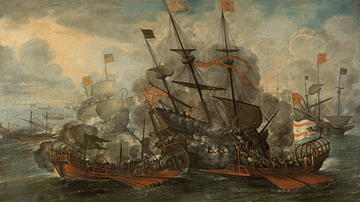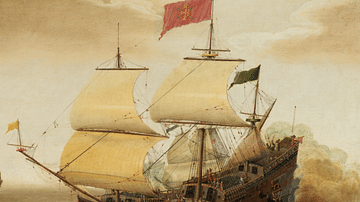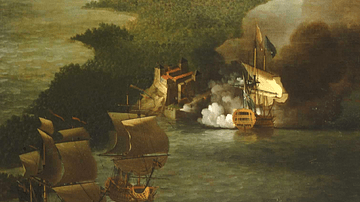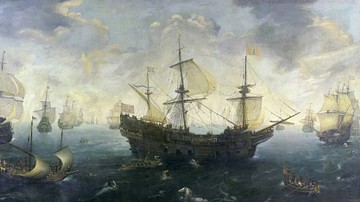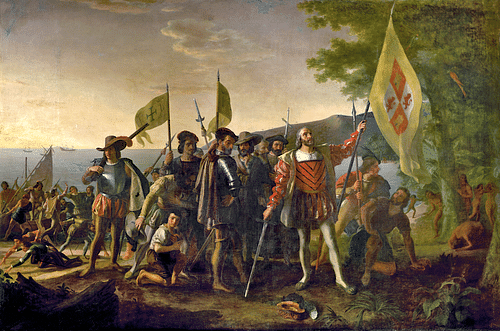
Adelantado was an office awarded by the Spanish Crown to conduct military campaigns in the medieval period but then repurposed during the Age of Exploration to grant an individual the right to privately fund expeditions of discovery and conquest in overseas territories. The adelantado could keep the lion-share of any resources they came across, provided they paid a smaller part to the Crown.
An adelantado, once he had conquered a territory, could set himself up as its governor and hand out positions of wealth and power to his comrades. After one year, the state generally stepped in and sent officials from Spain to begin to rule properly the new colony. In effect, then, the adelantados were the vanguard of the Spanish Empire as it expanded throughout the 16th century. Famous conquistadors ("conquerors") awarded the adelantado status include Christopher Columbus (1451-1506), Francisco Pizarro (1478-1541), and Juan Ponce de León (1474-1521).
The Exploration Franchise
Both the Portuguese and Spanish Crowns in the 16th century showed an interest in finding new lands for exploitation. The expense of forming a fleet of ships and men to sail the high seas was such that a method was found to pass on the costs to private individuals in return for granting the right to profit from the lands and resources discovered. This right was bestowed by the Spanish Crown with the office of adelantado. The office had been used in previous centuries for leaders of military expeditions, perhaps as early as the 10th century and certainly during the frontier battles between the Spanish and Moors in mainland Spain during the Reconquista. The role was also utilised with success by Isabella I of Castille (r. 1474-1504) to conquer the Canary Islands. The military leaders funded the campaigns and so reaped most of the rewards, with the Crown taking a slice.
As a consequence of the adelantado scheme being applied to exploration, the monarchy paid out very little and risked nothing but could potentially gain the international prestige of building an empire and enrich their coffers by taxing the resources discovered, especially precious metals like silver and gold. The cut of total profits the Crown might expect to gain from an adelantado's activities was 20%.

Adelantado means "one who goes before," and the appointee was a representative of the Crown. The adelantado signed a capitulación, a royal patent or license, which put in writing his promise to fund an expedition and find new territory for the Crown. In addition, there were certain clauses to be respected. These might include the number of priests and friars he was obliged to transport to his target area so that the local population might be converted to Christianity. Another stipulation could be the number of civilian settlers who had to be given places in the adelantado's ships. Given that the capacity to carry passengers was not great on ships of the period, the capitulación might stipulate a time limit for when the agreed number of clergy and settlers had to arrive in the new territory. On arrival, the adelantado was obliged to build towns and the necessary fortifications to protect them and the new territory and population in general.
In return for all of these burdens, the adelantado could claim 80% of all the resources he came across, earn money from rents from settlers, and enjoy almost total political control in the first year of occupancy. Further, under the category of resources came the labour of any local peoples in the area. Under the concept of encomienda (a feudal term), the adelantado was given the moral right to extract labour from anyone he came across both on his travels and at his destination. The dubious moral justification for what was, in effect, a process of forced labour at best and pure slavery at worst was that the native peoples received the opportunity of Christian salvation. Just as feudal peasants had been expected to devote their lives to their local lord in mainland Spain, so indigenous peoples overseas were expected to serve and protect their Spanish conquerors. This attitude might have eased a few consciences on the European side, but naturally, the indigenous peoples did not often see the relationship in these terms. There were, too, intense debates in Spain throughout the 16th century as to which of the often conflicting aims of material gain and religious conversion should be regarded as the most important.

Serving out the Spoils
Once a territory had been claimed by the adelantado for the Spanish Crown, he typically appointed himself the first governor, assuming he had managed to subdue any indigenous peoples in the area. The rights of the adelantado could be transferred to his heirs, as was the case with such figures as Christopher Columbus, whose eldest son Diego Columbus (c. 1479-1526) became the governor of Puerto Rico in 1511. The adelantado would then appoint some of his most loyal and capable expedition members in various other roles such as the military captain. The opportunity to gain such a position with its attached guarantee of income from part of the lands governed was a major point of motivation for men of adventure to join such expeditions, even if there was a very high risk of death, disease, and accident. The adelantado could, in exceptional circumstances and subject to later royal approval, even appoint another adelantado to govern a different territory such as Christopher Columbus did with his brother Bartholomew, who was made adelantado of Hispaniola (the modern Dominican Republic/Haiti) in 1494.
There were, too, some other intricacies with the adelantado system in how it worked in practical terms out in the colonies. The conquistadors were men of fortune and often loath to abide by the niceties of administrative titles dished out by the Spanish government. These men were not trained administrators and their policies of governance were often harsh in the extreme. There was, too, the not small matter that these men of ambition were often competing against each other for the same riches, and so fierce rivalries were the consequence. Often, the adelantado claimed credit back in Spain for the military successes of those achieved under him or in his territory, even if he had little to do with them personally. This caused further friction between the conquistadors. On the other hand, some non-adelantados chanced their arm, conquered a territory, and then hoped the riches they sent back to Spain would bring official recognition after the fact. There were some serious problems, for example, between Diego Velásquez de Cuéllar (1465-1524), the Governor of Cuba who regarded himself as the official adelantado for Mesoamerican conquest, and Hernán Cortés (1485-1547) who actually led the expeditionary force that conquered the Aztecs but who was not an adelantado. Velásquez, albeit temporarily, lost his governorship over the dispute in 1521.
Famous Adelantados
During the 16th century, 29 conquistador adventurers were given the status of adelantado. Famous explorers who were awarded the office include Vasco Núñez de Balboa (1475-1519), who crossed the Isthmus of Panama in 1513 and became the first European to sight the Pacific Ocean, Ferdinand Magellan (c. 1480-1521), whose expedition made the first circumnavigation of the globe in 1519-22, Pedro de Alvarado (c. 1485-1541), who led the particularly brutal conquest of the Maya in Guatemala in 1524, Francisco Pizarro, who conquered the Inca civilization in 1533, and Hernando de Soto (c. 1500-1542), who explored North America and the Mississippi River in 1539-42. Juan Ponce de León was given the office of adelantado for his second expedition to Florida in 1521. The agreement entailed paying a 10% tax on any gold or silver acquired – a figure which was reduced to 9% in the second year, 8% in the third year, and so on.
Various Levels of Adelantado
There were also additional levels of adelantado. The adelantado mayor was responsible for judicial and certain administrative matters in the new territories. Colonization was a dangerous and often bloody business, particularly away from the key European centres and military strongholds, and so an adelantado menor (aka adelantado fronterizo) was made responsible for maintaining frontiers and given an armed force under his command to do so. Then, as the new territory expanded even further, there was the adelantado del mar who commanded military expeditions given the specific task of expanding the colony's borders (the name of this position derives from its original role as a commander of maritime expeditions during the Crusades).
A fourth incarnation was the adelantado de la corte (aka adelantado del rey) who officially represented the Crown in certain areas of the administration. Eventually, after a colonized territory was well-established, a viceroy might be appointed who would arrive from Spain and take over from the adelantado. If the region already had a viceroy, then the adelantado in the new part of this corner of the empire still retained his monopoly of authority and he reported directly to the Council of the Indies (El Real y Supremo Consejo de las Indias) back in Spain which was in control of all administrative and judicial matters in the New World colonies. Nevertheless, after his first year, the adelantado usually gave way to officials shipped in from Spain to govern the area he had been the first to colonize. Given the tremendous acquisition of land and wealth by the Spanish Crown in the 16th century, the adelantado system was a remarkable success. Into the 17th century, the Spanish Empire was no longer expanding as it had been, and so the office of adelantado became redundant.


